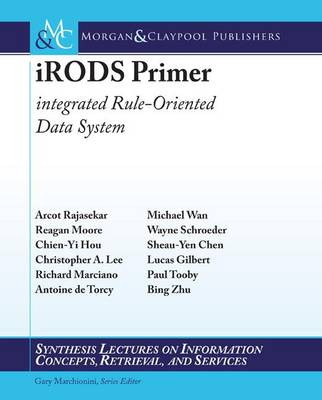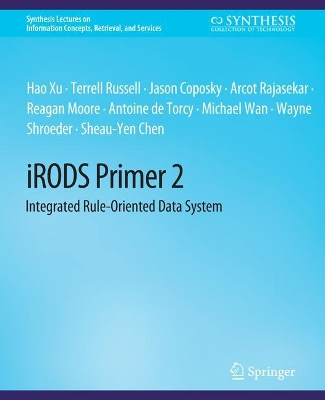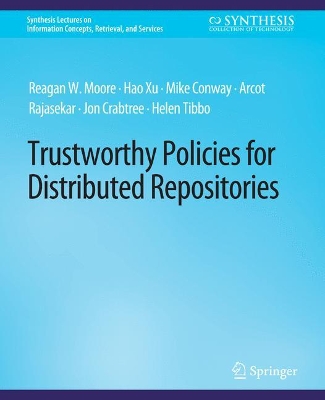Synthesis Lectures on Information Concepts, Retrieval, and Services
3 total works
Irods Primer
by Arcot Rajasekar, Reagan Moore, Chien-Yi Hou, and Christopher A Lee
Published 1 January 2010
Policy-based data management enables the creation of community-specific collections. Every collection is created for a purpose. The purpose defines the set of properties that will be associated with the collection. The properties are enforced by management policies that control the execution of procedures that are applied whenever data are ingested or accessed. The procedures generate state information that defines the outcome of enforcing the management policy. The state information can be queried to validate assessment criteria and verify that the required collection properties have been conserved. The integrated Rule-Oriented Data System implements the data management framework required to support policy-based data management. Policies are turned into computer actionable Rules. Procedures are composed from a Micro-service-oriented architecture. The result is a highly extensible and tunable system that can enforce management policies, automate administrative tasks, and periodically validate assessment criteria.
iRODS Primer 2
by Hao Xu, Terrell Russell, Jason Coposky, Arcot Rajasekar, Reagan Moore, and Antoine de Torcy
Published 26 March 2017
Policy-based data management enables the creation of community-specific collections. Every collection is created for a purpose. The purpose defines the set of properties that will be associated with the collection. The properties are enforced by management policies that control the execution of procedures that are applied whenever data are ingested or accessed. The procedures generate state information that defines the outcome of enforcing the management policy. The state information can be queried to validate assessment criteria and verify that the required collection properties have been conserved. The integrated Rule-Oriented Data System implements the data management framework required to support policy-based data management. Policies are turned into computer actionable Rules. Procedures are composed from a microservice-oriented architecture. The result is a highly extensible and tunable system that can enforce management policies, automate administrative tasks, and periodically validate assessment criteria. iRODS 4.0+ represents a major effort to analyze, harden, and package iRODS for sustainability, modularization, security, and testability. This has led to a fairly significant refactorization of much of the underlying codebase. iRODS has been modularized whereby existing iRODS 3.x functionality has been replaced and provided by small, interoperable plugins. The core is designed to be as immutable as possible and serve as a bus for handling the internal logic of the business of iRODS. Seven major interfaces have been exposed by the core and allow extensibility and separation of functionality into plugins.
Trustworthy Policies for Distributed Repositories
by Reagan W Moore, Hao Xu, Mike Conway, Arcot Rajasekar, and Jon Crabtree
Published 11 September 2016
A trustworthy repository provides assurance in the form of management documents, event logs, and audit trails that digital objects are being managed correctly. The assurance includes plans for the sustainability of the repository, the accession of digital records, the management of technology evolution, and the mitigation of the risk of data loss. A detailed assessment is provided by the ISO-16363:2012 standard, "Space data and information transfer systems—Audit and certification of trustworthy digital repositories." This book examines whether the ISO specification for trustworthiness can be enforced by computer actionable policies. An implementation of the policies is provided and the policies are sorted into categories for procedures to manage externally generated documents, specify repository parameters, specify preservation metadata attributes, specify audit mechanisms for all preservation actions, specify control of preservation operations, and control preservation properties as technology evolves. An application of the resulting procedures is made to enforce trustworthiness within National Science Foundation data management plans.


